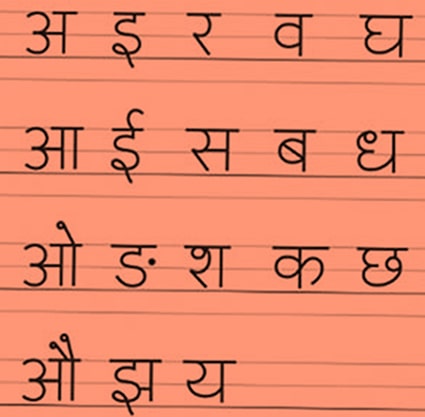Devanagari Handwriting

Understanding the Devanagari Script
Devanagari, also known as Nagari (नागरी), is a left-to-right abugida (alpha-syllabary) derived from the ancient Brahmi script of the Indian subcontinent. Its development dates back to the 1st–4th century CE, and it came into widespread use by the 7th century CE.
Belonging to the Brahmic family of scripts used across India, Nepal, Tibet, and Southeast Asia, Devanagari forms the basis for several modern Indian languages, including Hindi, Marathi, Sanskrit, and Nepali.
The word Devanagari is a compound of "deva" (देव), meaning divine or heavenly, and "nāgarī" (नागरी), derived from nagaram (नगरम्), meaning city or abode. Together, Devanagari can be interpreted as "script from the abode of the divine."
An alpha-syllabary is a writing system where consonant-vowel combinations are written as single units, with consonants as the base and vowels added through diacritical marks—making Devanagari both visually and structurally distinct.
Penkraft® Online Devanagari Handwriting Improvement Course
The Penkraft Online Devanagari Handwriting Improvement Course is a certified, age-appropriate, and scientifically structured program that introduces students to the beauty and discipline of the Devanagari script.
Students begin with:
- Basic strokes and letter formation
- Learning the arrangement and structure of consonants (व्यंजन) and vowels (स्वर)
As they progress, they move on to:
- Devanagari numerals (अंक)
- Punctuation marks (विराम चिह्न)
- Consonant-vowel combinations (बारहखड़ी)—a foundational step in word formation used in everyday vocabulary
The course culminates with:
- Sentence construction using correct punctuation
- Understanding letter spacing and word spacing within paragraph writing
Additionally, students are trained in:
- Posture while writing
- Proper notebook positioning
- Effective writing habits for long-term clarity and neatness
This holistic course not only enhances script proficiency but also deepens a learner’s connection with one of India’s most revered and classical writing systems.

